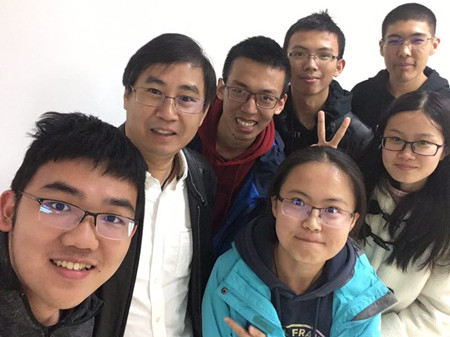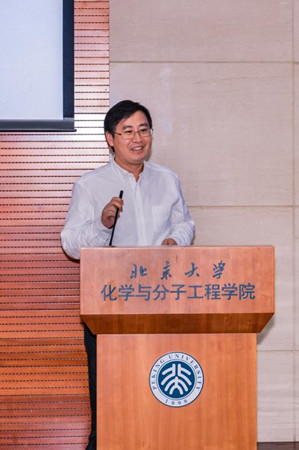Peking University, March 30, 2018: Recently, professor Pei Jian of PKU’s College of Chemistry and Molecular Engineering was honored as part of the 22nd cohort of "Most Popular Professors" awardees. This award was founded in 1996 and, since then, the ten most popular professors have been honored each year.
Professor Pei has always been popular among his students. In 2006, he was the recipient of the Excellent Teaching Material in Beijing and, in 2011, he was recognized as the Fifth University Distinguished Teacher of Beijing. He was also awarded The National Science Fund for Distinguished Young Investigator Award in 2004 and Yangtze River Scholarship in 2012 for his academic devotion to organic semiconducting materials and optoelectronic devices. In addition, he has taken an active role in reforming undergraduate studies at Peking University. What he wants the most from his students is to cultivate a sense of responsibility and dedication to helping those in need during their time at PKU.
A mentor, and a friend
Professor Pei always tells his postgraduates that he is not their “boss.” He believes that the relationship between a supervisor and his or her students in Chinese universities is closer to the practice of ancient Chinese mentorship. In ancient China, an apprentice not only worked under the supervisor’s guidance but also lived with his or her mentor. This allowed the student to learning from the mentor’s life experiences in addition to his or her professional skills. In Professor Pei’s eyes, the traditional mentorship system is not applicable to modern universities, but the spirit of the system remains. Beyond professional skills, like how to design experiments or write manuscripts, students also learn from their supervisor what defines a good person and a meaningful life.

With Students (second from left)
As for Pei himself, he adopts a down-to-earth and gentle way to communicate with his students. Zhuang Fangdong, a fourth year Ph.D. student, was nominated to be the PKU 2017 Student of the Year for his academic achievements as well as his devotion to mountain climbing. Before joining the PKU mountain climbing team, he talked with Professor Pei about how to balance his physical training and his research work. Pei says that being a member of the mountain climbing team surely takes up a large portion of Zhuang’s research time. He did not discourage Zhuang’s climbing ambitions, however, because he believes that students should have dreams outside of academic success. Pei explains that if he did not support Zhuang’s endeavors, it would be a great pity for Zhuang.
Apart from the mentor-student relationship, some students complain that lab work brings too much pressure. Pei has a different opinion. He thinks the complaints stem from students lacking a clear idea of what they want to get from their postgraduate study. For example, some students believe they are underpaid working in university labs because they can get a much higher salary as an intern in industry. Pei explains, however, that studying at PKU is wholly different from working at a company. The goal is not to make money, but to embark on a lifelong journey of learning. Therefore, he urges students to reflect on their decision to attend PKU and how that ties into their goals in life.
Pei’s ideas are well-founded and based off of his previous experiences. Since around 2008, he has been in charge of recruiting high school students who participate in national Chemistry Olympiads to PKU. He found that many of these students’ parents had strong opinions on the monetary benefits of a university degree, and did not value the experience of attending university. These parents often got involved with the university recruitment, asking questions like what major makes the most money or what benefits they can get if their children go to PKU instead of THU (Tsinghua University). Pei says that their mentality is strictly utilitarian - the choice with more benefits wins.
For Pei, university is not a place where students learn how to make money. Pei spent nearly ten years at PKU from 1985 to 1995, first as an undergraduate and then as a Ph.D. student, both in chemistry. What he values most is not the knowledge of organic chemistry but what he learned from some great teachers like Professor Qian Liqun, whose lectures on Lu Xun he greatly enjoyed. Furthermore, he believes that being a mentor holds more responsibility than simply guiding students in their academic exploration. It is a job requiring conscience, as he also must guide his students to be righteous and empathetic individuals.
Be united, be responsible
Looking back to the year 2001, Professor Pei feels that the major difference between students in 2001 and students in 2017 is that they do not work as hard as before. But he does not blame his students for this. This is how society works now, he says. He agrees with Professor Qian’s criticism that Chinese universities are cultivating well-educated egotists who pursue maximal profit for themselves without any concern for those suffering around them. Pei adds that students are talking less and less about their “dreams” now.
Pei always tells his students to remain united and help each other. PKU recruits the best young students in China - these students should shoulder the responsibility for leading China to a brighter future. If the future elites of China do not care about social issues like poverty, how can they make China better? A meaningful life, Pei believes, does not lie in its length but in its depth. Among PKU students, there are those who constantly motivate themselves to become better people and contribute to society. There are also those who need constant reminders of their social responsibilities. It is the latter that make up the majority of PKU students. Pei cannot personally provide advice to each of these students, but his door is always open to those who come to him with an open mind.

Pei delivering a speech
Talking about the most valuable qualities of students, Pei thinks that leadership and team spirit are the most important. Leadership means that PKU students should be able to lead China to a better future, while team spirit means that PKU students should think more of how to benefit other people. He does not include academic capability because he believes that PKU students are equipped with enough intelligence to cope with academic research. The key to academic success lies in students setting high standards for themselves. If students have higher academic expectations for themselves, they will surely achieve success through hard work and perseverance.
The undergraduate reform that began in 2016 is another way for PKU students to explore their interests and make full use of their potential. The reform aims to bring more freedom for students, including new majors, interdisciplinary programs, and more flexibility for changing majors. The reform requires more teachers with outstanding teaching abilities and more courses of high quality. Some students come to Pei and complain that some departments are not very welcoming of students from other departments or do not put much effort into designing their core curriculum. Many more students, however, say that they have been provided with more freedom to choose interesting courses. Pei thinks the reform is off to a good start and will bring even more benefits to students if each following step is well executed.
A professor, a father
Pei’s cell phone and the landline in his office rang several times during the interview. Apart from teaching classes, Pei also manages his lab, guides the research of his students, participates in undergraduate reforms, recruits high school students, and writes textbooks. Nevertheless, he always manages to find a balance between all of his responsibilities. Just squeeze your time out, and there will always be more of it, Pei says.
When writing Basic Organic Chemistry (Volume II), Pei had to pour over many books collecting materials. At the same time, he also refined his knowledge, preparing him for his ongoing research. Sometimes, teaching and research are mutually beneficial. For example, when teaching undergraduates in Organic Chemistry, he has learned a lot through his discussions with students.
In addition, when he was writing the textbook, Pei’s son was a middle school student preparing for his high school entrance exam. Every day after work, Pei would sit together with his son - Pei writing his book and his son writing his homework. When his son finished his homework, Pei would examine the homework and correct some mistakes. The previously distant father-son relationship greatly warmed during that time of fighting side by side.
Pei once thought about cultivating his son’s interest in chemistry. Pei says his son now has zero interest in chemistry but, perhaps this is because he put too much pressure on his son. Pei, however, does not mind that a chemistry professor’s son does not want to learn chemistry. What he considers important is that his son can grow up with a strong body and a healthy mind. He asks only three things from his son: never lie, never bully others, and care for others.
On Zhihu, the Chinese version of Quora, someone posted asking users what they thought of Professor Pei Jian. More than 100 users liked Pei’s son’s answer: “He is aware of his obligations and ready to shoulder his responsibility. He has provided for his son the happiest childhood that anyone could dream of.”
Reported by: Yan Shengnan
Edited by: Erin Dunne, Zhang Jiang